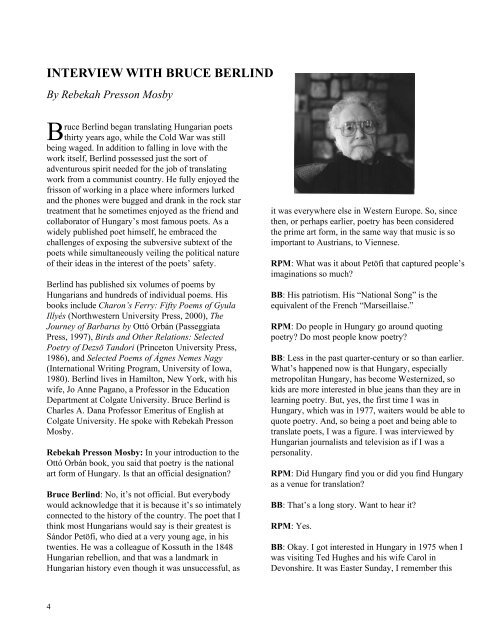their - The University of Texas at Dallas
their - The University of Texas at Dallas
their - The University of Texas at Dallas
You also want an ePaper? Increase the reach of your titles
YUMPU automatically turns print PDFs into web optimized ePapers that Google loves.
INTERVIEW WITH BRUCE BERLIND<br />
By Rebekah Presson Mosby<br />
B<br />
ruce Berlind began transl<strong>at</strong>ing Hungarian poets<br />
thirty years ago, while the Cold War was still<br />
being waged. In addition to falling in love with the<br />
work itself, Berlind possessed just the sort <strong>of</strong><br />
adventurous spirit needed for the job <strong>of</strong> transl<strong>at</strong>ing<br />
work from a communist country. He fully enjoyed the<br />
frisson <strong>of</strong> working in a place where informers lurked<br />
and the phones were bugged and drank in the rock star<br />
tre<strong>at</strong>ment th<strong>at</strong> he sometimes enjoyed as the friend and<br />
collabor<strong>at</strong>or <strong>of</strong> Hungary’s most famous poets. As a<br />
widely published poet himself, he embraced the<br />
challenges <strong>of</strong> exposing the subversive subtext <strong>of</strong> the<br />
poets while simultaneously veiling the political n<strong>at</strong>ure<br />
<strong>of</strong> <strong>their</strong> ideas in the interest <strong>of</strong> the poets’ safety.<br />
Berlind has published six volumes <strong>of</strong> poems by<br />
Hungarians and hundreds <strong>of</strong> individual poems. His<br />
books include Charon’s Ferry: Fifty Poems <strong>of</strong> Gyula<br />
Illyés (Northwestern <strong>University</strong> Press, 2000), <strong>The</strong><br />
Journey <strong>of</strong> Barbarus by Ottó Orbán (Passeggi<strong>at</strong>a<br />
Press, 1997), Birds and Other Rel<strong>at</strong>ions: Selected<br />
Poetry <strong>of</strong> Dezsö Tandori (Princeton <strong>University</strong> Press,<br />
1986), and Selected Poems <strong>of</strong> Ágnes Nemes Nagy<br />
(Intern<strong>at</strong>ional Writing Program, <strong>University</strong> <strong>of</strong> Iowa,<br />
1980). Berlind lives in Hamilton, New York, with his<br />
wife, Jo Anne Pagano, a Pr<strong>of</strong>essor in the Educ<strong>at</strong>ion<br />
Department <strong>at</strong> Colg<strong>at</strong>e <strong>University</strong>. Bruce Berlind is<br />
Charles A. Dana Pr<strong>of</strong>essor Emeritus <strong>of</strong> English <strong>at</strong><br />
Colg<strong>at</strong>e <strong>University</strong>. He spoke with Rebekah Presson<br />
Mosby.<br />
Rebekah Presson Mosby: In your introduction to the<br />
Ottó Orbán book, you said th<strong>at</strong> poetry is the n<strong>at</strong>ional<br />
art form <strong>of</strong> Hungary. Is th<strong>at</strong> an <strong>of</strong>ficial design<strong>at</strong>ion<br />
Bruce Berlind: No, it’s not <strong>of</strong>ficial. But everybody<br />
would acknowledge th<strong>at</strong> it is because it’s so intim<strong>at</strong>ely<br />
connected to the history <strong>of</strong> the country. <strong>The</strong> poet th<strong>at</strong> I<br />
think most Hungarians would say is <strong>their</strong> gre<strong>at</strong>est is<br />
Sándor Petöfi, who died <strong>at</strong> a very young age, in his<br />
twenties. He was a colleague <strong>of</strong> Kossuth in the 1848<br />
Hungarian rebellion, and th<strong>at</strong> was a landmark in<br />
Hungarian history even though it was unsuccessful, as<br />
it was everywhere else in Western Europe. So, since<br />
then, or perhaps earlier, poetry has been considered<br />
the prime art form, in the same way th<strong>at</strong> music is so<br />
important to Austrians, to Viennese.<br />
RPM: Wh<strong>at</strong> was it about Petöfi th<strong>at</strong> captured people’s<br />
imagin<strong>at</strong>ions so much<br />
BB: His p<strong>at</strong>riotism. His “N<strong>at</strong>ional Song” is the<br />
equivalent <strong>of</strong> the French “Marseillaise.”<br />
RPM: Do people in Hungary go around quoting<br />
poetry Do most people know poetry<br />
BB: Less in the past quarter-century or so than earlier.<br />
Wh<strong>at</strong>’s happened now is th<strong>at</strong> Hungary, especially<br />
metropolitan Hungary, has become Westernized, so<br />
kids are more interested in blue jeans than they are in<br />
learning poetry. But, yes, the first time I was in<br />
Hungary, which was in 1977, waiters would be able to<br />
quote poetry. And, so being a poet and being able to<br />
transl<strong>at</strong>e poets, I was a figure. I was interviewed by<br />
Hungarian journalists and television as if I was a<br />
personality.<br />
RPM: Did Hungary find you or did you find Hungary<br />
as a venue for transl<strong>at</strong>ion<br />
BB: Th<strong>at</strong>’s a long story. Want to hear it<br />
RPM: Yes.<br />
BB: Okay. I got interested in Hungary in 1975 when I<br />
was visiting Ted Hughes and his wife Carol in<br />
Devonshire. It was Easter Sunday, I remember this<br />
4

















